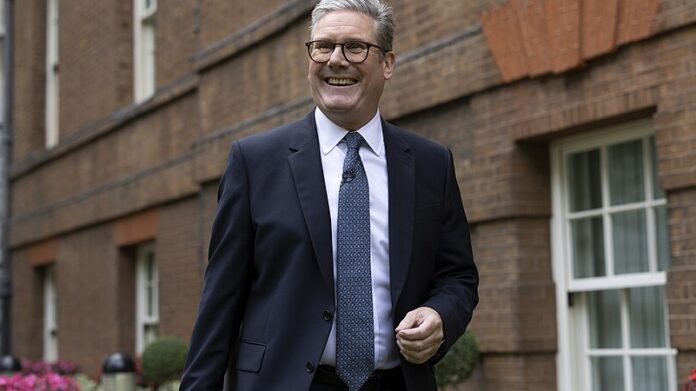PM pledges 13,000 frontline officers and visible patrols to tackle crime and win back public trust
Keir Starmer will announce sweeping plans to reintroduce visible foot patrols in every busy neighbourhood in England and Wales, promising a return to traditional community policing in a move billed as a revival of “bobbies on the beat”.
Unveiled ahead of May’s local elections, the policy aims to restore public confidence in law enforcement after years of dwindling visibility and increasing antisocial behaviour. By July, the government wants dedicated officers walking the streets during peak times, such as Friday and Saturday nights.
In addition, every neighbourhood will receive a named, contactable officer, according to officials. The initiative forms part of a broader Labour strategy to show it is tough on crime and committed to public safety, following mounting pressure on the party to deliver tangible policies for local candidates.
“For years, crimes such as shoplifting and antisocial behaviour have wreaked havoc on our neighbourhoods,” Starmer will say. “Policing has become reactive, picking up the pieces after crimes have occurred. Britain deserves better.”
The plan builds on Labour’s manifesto pledge to add 13,000 new personnel to neighbourhood policing by 2029, using a mix of warranted officers, community support officers, and volunteer specials. The first tranche — about a third — will be announced this week.
The model takes inspiration from the Greater Manchester Police’s (GMP) successful neighbourhood crime strategy. Since adopting the approach, GMP claims burglary rates have dropped by 33%, vehicle crime by 25%, and weekly convictions for shoplifting have soared to around 100.
GMP has also experimented with undercover tactics, including placing officers in supermarket uniforms to catch shoplifters. Ch Insp Stephen Warriner acknowledged the need for such strategies, noting that the force had lost the confidence of local communities and businesses.
“We will certainly do our utmost to blend in as part of the community,” Warriner said, without denying the use of undercover officers in stores.
Retailers, meanwhile, have voiced growing concerns. Darryl Stuart-Cole, who manages a Co-op in Withington, south Manchester, said his store is targeted up to 30 times a week. “Some of my staff are scared to come to work. Four or five offenders are responsible for most of the theft,” he said.
Embed from Getty ImagesLabour says the new model includes a designated antisocial behaviour lead officer in each force, who will work with residents and local businesses to create tailored action plans. Police chiefs will have some flexibility over the blend of officers and support staff.
While police forces have welcomed the extra investment, some remain wary. “It’s welcome money,” said a senior officer. “We’d rather it came without strings so we could direct it where we see fit. But no chief will say no to more frontline officers.”
Funding remains a sore point. Though the government has earmarked £200 million for neighbourhood policing this year, some forces warn it won’t cover existing gaps and may lead to further internal cuts.
The announcement arrives at a politically sensitive moment, with crime a key issue in the upcoming local elections. A recent YouGov tracker found that 63% of Britons think the government is handling crime poorly.
Chris Philp, the Conservative shadow home secretary, criticised Labour’s approach. “The previous Conservative government delivered record police officers,” he said. “Law and order is taking a backseat under Labour. They must urgently get a grip.”
Labour argues that while police numbers grew in recent years, effective neighbourhood policing was hollowed out by austerity-driven cuts after 2010, which stripped away 20,000 officers. Starmer’s announcement seeks to reverse that legacy with a visible, locally focused response.
BBC
Prime Minister Keir Starmer is set to announce a major push for more visible policing in town centres across England and Wales, with dedicated officer patrols during peak times to tackle rising anti-social behaviour and shoplifting. The initiative forms part of Labour’s pledge to recruit 13,000 neighbourhood officers by 2029, aiming to end the “postcode lottery” in policing and return prevention to the core of the strategy. However, the plan faces significant funding challenges, as police forces warn of a £1.3bn budget shortfall and potential job losses. The Conservatives blamed Labour’s national insurance hike for risking 1,800 police roles, while the Liberal Democrats and Reform UK questioned the feasibility and priorities of the strategy. The policy includes placing anti-social behaviour leads in every force and tailoring action plans with communities, though operational decisions will remain with local forces. Critics urged the government to provide adequate funding rather than shifting responsibility onto local councils.
GOV.UK
Prime Minister Keir Starmer has unveiled a major plan to restore trust in policing by introducing the Neighbourhood Policing Guarantee, pledging 13,000 additional officers by 2029—a 50% increase. The initiative aims to end the “postcode lottery” in law enforcement by assigning named, contactable officers to every neighbourhood and ensuring visible police patrols during peak times, particularly in town centres. A new Police Standards Unit will monitor force performance, allowing the public to hold forces accountable via an online tool. Backed by new powers in the Crime and Policing Bill, the reforms include Respect Orders for persistent antisocial behaviour and expanded police powers for low-level theft and phone crime. The government claims the measures will reverse falling public confidence after years of soaring crime and absent local policing. Retailers, hospitality leaders, and policing chiefs have welcomed the move, although concerns over funding and long-term implementation remain. The guarantee forms part of Labour’s wider Plan for Change.
